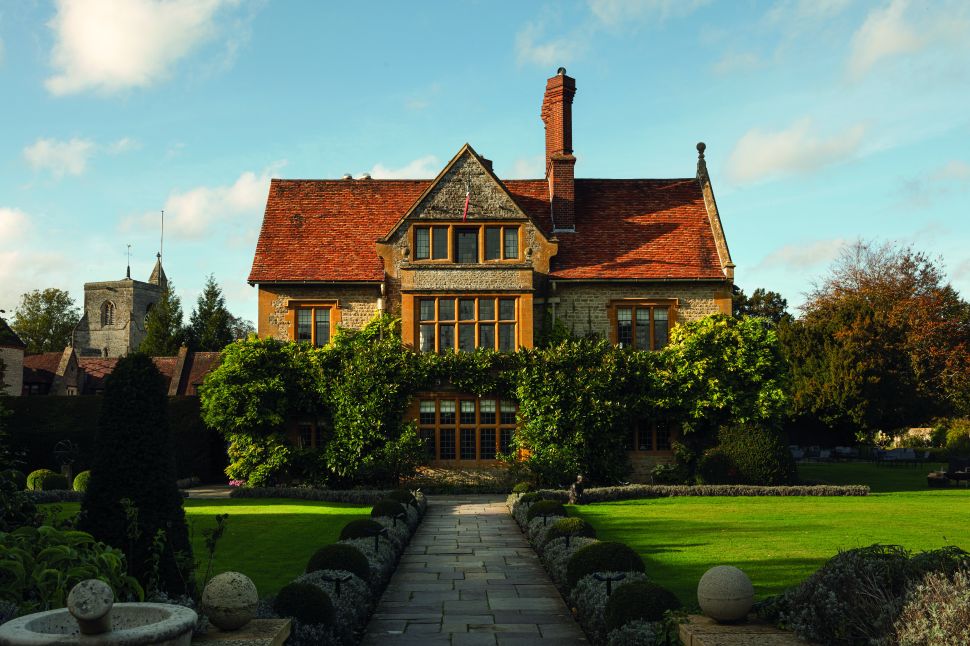Long before “sustainability” and “farm-to-table” were little more than culinary buzzwords, Raymond Blanc’s Le Manoir aux Quat’Saisons was already implementing both concepts in a honey-hued corner of the Cotswolds in Oxfordshire. Four decades later, the gastronomy-focused getaway, now part of the Belmond portfolio, continues its pioneering approach to agricultural and culinary excellence, while remaining grounded in nature.
A self-taught chef, Blanc earned two Michelin stars at Les Quat’Saisons—his first restaurant—in 1981. Still, he wasn’t quite satisfied. “I longed for something more—a home for my guests, a place where every detail mattered,” Raymond Blanc, chef patron of Le Manoir aux Quat’ Saisons, tells Observer. “The moment I first laid eyes on this estate in the Cotswolds, I fell in love and saw an opportunity to bring l’art de vivre [the art of living] to life.” Comprising 27 acres of gardens, orchards and ancient ponds, the property became the canvas for his vision: a retreat that celebrates the best in food, nature and comfort.
Since the beginning, seasonality, foraging and zero waste were part and parcel of the holistic approach. Gardening started as a complement to the gourmet side and continues to grow in tandem with it. The restaurant, Le Manoir aux Quat’Saisons, is a gastronomic force that’s earned and retained two Michelin stars for 40 years. The menu celebrates fresh, locally grown ingredients. The gardeners’ work supports the culinary team’s skill and passion.
Across the property, the team nurtures everything from broad beans and zucchinis to edible flowers and chard. Vegetables are chosen through taste trials to find the best ones for the climate, soil type and flavor. “In our heritage garden, specifically, we work alongside Garden Organic to cultivate lost, old and forgotten seeds. It’s primarily for educational purposes, but some make it into the kitchen,” explains John Driscoll, head gardener at Le Manoir aux Quat’ Saisons. Rouge Crapaudine, one of the oldest known cultivated beetroot, and Kew Blue, a climbing French bean, are now staples for the chefs. The orchards grow heritage varietals of apples and pears. Most of the produce goes from the ground to the gullet in a matter of hours, without losing an ounce of vibrancy on the back of a truck.
At Le Manoir, gardening is the first step in exquisite gastronomy. The next requires the skill and dedication of the kitchen, where chefs turn raw products into works of culinary art. In the evenings, the well-lit dining room buzzes with diners digging into beautiful, seasonal plates. It’s a celebration of ingredients in the purest form, with equal thought given to creativity and technique.
The seven-course tasting menu (£255 per person) and wine pairing (£135 per person) is the biggest draw. However, the à la carte option (£215 per person) doesn’t skimp on artistry or flavor. When I visited in early spring, my gastronomic experience started with beetroot terrine and continued onto Cornish lobster tempura, and finished with a pineapple and cherry dessert (I’m dairy-free). Even the most finicky foodie wouldn’t be disappointed by either. The cozy, fire-warmed lounges are the ideal spot to start the evening with an aperitif or bubbles and gourmet snacks (olives and potato chips) before dinner or wind down with a nightcap.
Overnight guests have the distinct pleasure of rising to the scent of fresh-baked sourdough and pastries, which are offered alongside a breakfast spread including Greek yogurt, berries, local cheese and omelets made with farm-fresh eggs. In the morning, gardeners lead tours of the culinary gardens through the lavender-framed paths, fertile produce beds, greenhouses and orchards. During a March visit, our guide fielded multiple questions about kale spacing, which she was all too happy to answer. Folks are welcome to go for a stroll anytime; I spent hours puttering past the rows and reading the signage for the newly planted spring crops.
In 2017, Le Manoir opened a first-of-its-kind gardening school, which quickly became a respected place of horticultural learning. Budding chefs and the culinary curious can also sign up for half-day introductions and dinner party master classes at the cookery school or opt for a wine tasting tour through the cellars, followed by Champagne and canapés.
At the end of a palate-pleasing day in the countryside, guests can retire to the comforts of individually decorated rooms and suites inspired by Blanc’s travels. In one accommodation, you might find Lalique artwork, a standalone tub and hues that nod to Provence. Other spaces are wrapped in jewel tones and showcase exposed beams. Some have private terraces and small gardens—a reminder that at Le Manoir, nature is a sacred part of the experience.
More than 40 years after opening, the drive to push the epicurean envelope prevails. “We are constantly looking for ways to innovate and further develop our ethos,” says Blanc. Le Manoir brought on an on-site composter in 2020, which means almost no waste goes to, well, waste. All cooked and raw meat scraps, citrus peels, fruit skins and prunings all get turned into fuel for the garden.
The pioneering property and its two-Michelin-starred restaurant are currently developing a coffee liquor made out of used coffee grounds that would otherwise be discarded. Blanc also has his sights set on a blank plot that’s “well suited for a small vineyard.” At some point in the not-so-distant future, guests might be able to start a memorable meal with a glass of house-made sparkling wine. While the U.K. is a major consumer of wine, it doesn’t have an established viticulture industry like France, Italy or Spain. Creating a model for local production is the next step toward creating a more sustainable gastronomic retreat, and it’s no surprise that Blanc wants to be at the forefront.

